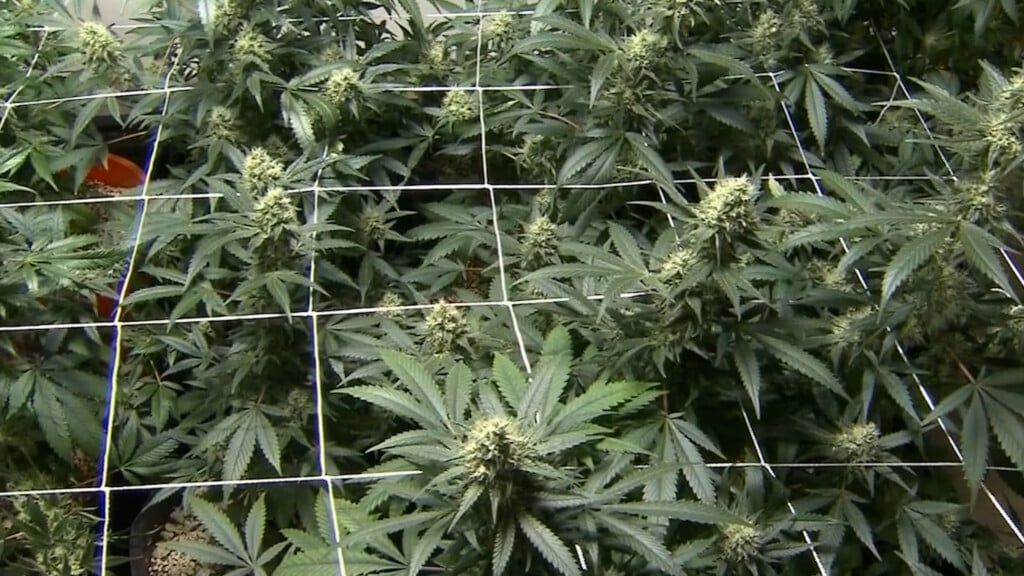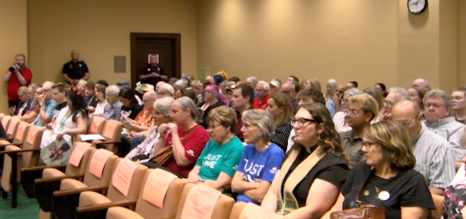Gov. Pillen proposes raising Nebraska sales tax by 2 cents to lower property taxes
LINCOLN, Neb. (Nebraska Examiner, Paul Hammel) — Gov. Jim Pillen has loaded up a self-described “bold and courageous” proposal to decrease property taxes via an increase in state sales taxes.
The state sales tax rate would climb by 2 cents, from 5.5 cents to 7.5 cents, the Nebraska Examiner learned Tuesday.
Revenue from the 36% hike in sales taxes would be used to help lower local property taxes — a “tax shift” rejected by former Gov. Pete Ricketts as a tax increase.
A spokeswoman for Pillen said the “bold and courageous” idea was prompted by the failure of other recent efforts to decrease local property taxes.
“Nebraskans cannot afford to keep watching their property taxes skyrocket, with absolutely no relief in sight,” spokeswoman Laura Strimple said.
A state sales tax rate of 7.5% in Nebraska would make it the highest in the country, according to the Sales Tax Institute.
The tax shift is the keystone of Pillen’s promised “transformative” proposal on property taxes to reduce them from a total of $5 billion a year on all taxpayers to $3 billion. The plan includes a tougher lid on local spending.
Immediate reaction to the proposal, which was endorsed by a “working group” of government and business officials appointed by Pillen, was mixed.
Sen. Lou Ann Linehan, who chairs the legislative committee that deals with tax issues, said such an increase deserves a discussion in the Legislature, which opened its 2024 session Wednesday.
Lawmakers, she said, have increased state payments to reduce local property taxes by $1 billion during her seven years in the Legislature, but property taxes keep rising and have outpaced that additional aid.
“We have to do something about our overreliance on property taxes in Nebraska,” said Linehan, a key ally of Pillen in the Legislature. “It’s really ridiculous.”
Under the proposal, groceries would continue to be tax-exempt in the state, possibly blunting some opposition from advocates for low-income Nebraskans.
But the cost of other goods, such as automobiles, clothes and supplies such as diapers, would see a jump.
Rebecca Firestone, the executive director of the OpenSky Policy Institute, which analyzes state policies, said on X that such an increase in sales taxes would make the Nebraska tax code “even more regressive” for lower-income residents.
“That’s a 36-percent increase for all consumers in the state, for the purpose of reducing taxes for just property owners,” Firestone said on the platform formerly known as Twitter.
Currently, the highest state sales tax rate in the nation is in California, at 7.25%, followed by a handful of states at 7%.
The highest state sales tax rate among Nebraska’s neighbors is in Kansas at 6.5%.
Sen. Carol Blood of Bellevue said there needs to be more consideration of such a tax increase by state lawmakers other than what was provided by Pillen’s working group, which was formed in July initially to look at skyrocketing property valuations across the state. Later, the group’s focus turned to reducing property taxes.
“We have to approach this in a more strategic fashion,” Blood said. “The solution for less property taxes isn’t more taxes.”
Sen. Ben Hansen of Blair said that if the result of a sales tax hike is a net decrease in total tax load, by decreasing property taxes, that’s a good thing.
“I’ve always thought that sales tax and consumption tax were more fair than property tax,” Hansen said, because you have some choice in whether to purchase an item.
Hansen added that there’s frustration among lawmakers that past efforts to decrease local property taxes haven’t been as successful as hoped.
Then property valuations spiked by double digits during the past year, prompting more desire for change, he said.
“I think what happened with valuation increases really upped the appetite among senators to be a little more bold,” Hansen said.
Sen. Joni Albrecht of Thurston, who was part of the working group, said lawmakers need to demonstrate that they’re “serious” about tackling the No. 1 issue in the state: high property taxes.
Albrecht said the working group looked at a lot of options, including eliminating some current sales tax exemptions.
“We were peeling people off the ceiling with some of those,” she said.
Albrecht, like others, said that the 2-cent increase is just the starting point and that it could be amended lower. She suggested that if property taxes are lowered, that could be passed along to renters.
The big question, Albrecht said: “Is this something that’s going to be really painful, or something we can sell to the public?”
Two other senators on the working group, Brad von Gillern of Omaha and Eliot Bostar of Lincoln, said they wanted to see the complete proposal from the governor before commenting.
A Lincoln car dealer — who would see the price tag for a $10,000 vehicle increase by $200 — had a lukewarm reaction on Tuesday.
Tom Dean of Durst Motors said Lincoln residents are already paying about 10% to license a car when considering local and state sales taxes and licensing fees, though a 2-cent sales tax hike “is no small item.”
“I don’t care to pay any taxes,” Dean said, adding that the big problem in government is too much spending.



